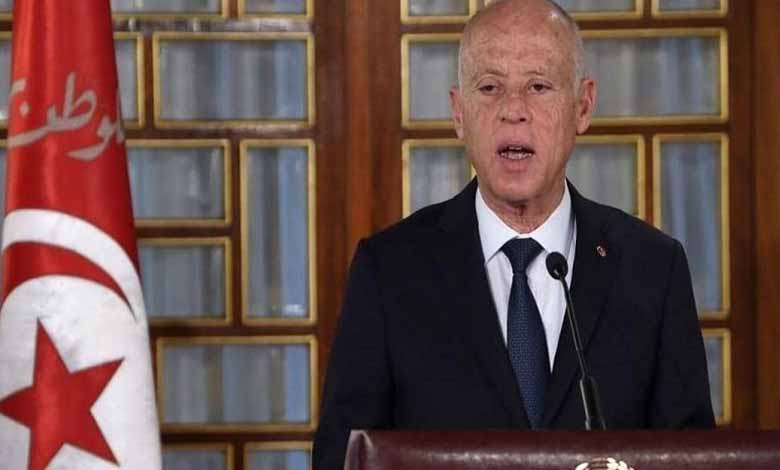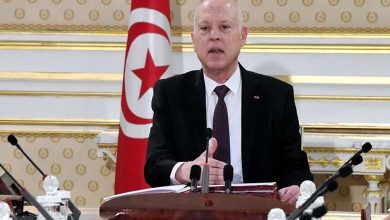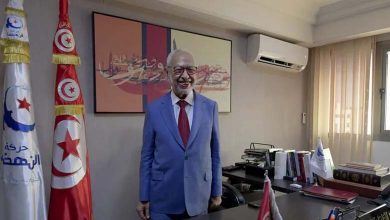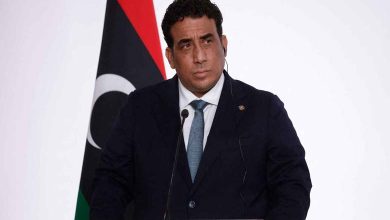Tunisian President Kais Saied calls for purging administrations of arbitrary appointments

The Tunisian President emphasized the need to expedite a thorough review of appointments made after 2011, and to hold accountable anyone obstructing projects with baseless excuses. On Friday evening, Tunisian President Kais Saied called on Prime Minister Ahmed El-Hachani to launch a cleansing campaign within administrations against those who obstruct the implementation of developmental projects in the country. This would be achieved through a meticulous review of appointments made after 2011.
Saied’s call comes in response to popular demands to investigate suspicious appointments, especially among holders of advanced university degrees. They accuse the parties that led the country in recent years of opening doors to public service positions for their supporters and loyalists, disregarding competence as a criterion.
After the uprising that toppled the late President Zine El Abidine Ben Ali, Tunisia witnessed a polarization and sharp political conflicts between Islamists and secularists. These conflicts extended beyond major policy choices and also affected appointments within the Tunisian administration, with some believing it succumbed to partisan quotas.
During his meeting with the Prime Minister, President Saied emphasized the importance of coherence between all ministries within the framework of policies set by the Head of State.
He also stressed the need to “accelerate a thorough review of all appointments made since 2011,” noting that “this review has become urgent, especially given that a number of administrations have hindered state policies.” This was evident recently when an official refused to accept a financial contribution for the benefit of the state.
Saied pointed out that such behavior should be held accountable, especially considering it is prevalent in various administrations, just as it has hindered various projects under baseless pretexts in sectors like health, education, and private companies.
He affirmed that the administration must fulfill its role, and every official should feel that they are serving the state, not a specific entity or pressure group that believes it can obstruct state policies.
He reminded that the administration is an extension of political authority, with the duty of execution, and that any future procrastination or obstruction will not be tolerated. Additionally, many citizens have come to rely on officials who see themselves as above accountability for their affairs.
The Tunisian government opened several cases last year related to corruption and terrorism dating back to the years described as the “dark decade.” It also responded to calls for an investigation into appointments made in recent years and opened the file of suspicious appointments in the civil service, which is considered one of the most dangerous forms of corruption that characterized the ruling system led by the Ennahda movement.
Former government spokesperson Nasreddine Noussibi announced in November last year that “various ministries have started a process of verifying the academic qualifications of their staff to confirm their validity.”
He added, in media statements, that “every case involving a forged certificate will be referred to the judiciary,” confirming the adoption of a visible electronic stamp for all academic certificates to prevent future abuses.
In November last year, investigations into the case of suspicious jobs and appointments revealed the employment of 47,000 employees based on forged academic certificates during the rule of the Ennahdha movement.
These verifications followed investigations in October last year that exposed the involvement of 16 individuals from the Kasserine governorate in forging academic certificates to obtain positions in various municipalities. The public prosecutor’s office of the Court of First Instance in Kasserine ordered their detention after evidence of forgery was found.
Two months prior, authorities in Tunisia decided to imprison other employees who were working with forged school certificates. This brought back the debate about many individuals obtaining government positions in sectors such as education, finance, health, and more, by falsifying various academic certificates over the past decade.
About a year ago, investigations into the case of suspicious jobs and appointments revealed the employment of 47,000 employees based on forged academic certificates. Over 150 teachers and professors were subjected to investigations, and it was found that their educational level did not match their professional rank. Moreover, cases of forged certificates for managers, engineers, and even ministers were discovered. The continuation of salary payments to hundreds who had passed away was also revealed, a very serious crime after funds of the state treasury were embezzled through manipulative operations.
In October last year, the Tunisian Ministry of Social Affairs referred over 200 cases to the Financial Judicial Pole regarding forged academic certificates and suspicious appointments following administrative investigations.
The head of the Association Against Corruption confirmed that the number of cases involving forged certificates that were referred to the judiciary is very low, indicating that the matter was “more audacious” during the dark decade under the rule of the Ennahdha movement. This contributed to the collapse of the civil service and its inundation with appointments, with the number of employees rising from around 217,000 in the public sector to 800,000 in a few years, leading institutions to fail in performing their tasks and going bankrupt.
According to an official study conducted by the Tunisian Institute for Strategic Studies, which is affiliated with the presidency, the number of beneficiaries of the general legislative amnesty (mostly from the Ennahdha leadership and its base) who were randomly appointed to the civil service without competitive exams after 2012 reached 6,839 employees.
The general legislative amnesty was passed just a few weeks after the fall of the late President Zine El Abidine Ben Ali, during the second government of Mohamed Ghannouchi. It was practically implemented after 2013 when the Ennahdha movement gained power.
Concerning the appointments made under the general legislative amnesty during the era of the Troika (led by the Ennahdha movement) and their relation to the country’s circumstances at the time, the resigned leader of the Ennahda movement, Abdelatif Mekki, confirmed at the end of 2015 that 95% of those appointed to the civil service were supporters, numbering around 7,000 individuals, and only 4,000 were actually employed.
He stated that a special committee was formed to consider other appointments, stressing that not all of them were Ennahdha members.
The Tunisian newspaper “Al-Maghreb” revealed in an investigative report that around 10,000 people benefited from the general legislative amnesty. 3,646 people received 6,000 dinars as an advance, while another 6,000 were appointed to government positions based on a government order issued in 2012.
Regarding the activation of appointments, there were 7,519 appointments made on paper, while 5,850 people actually started work. Among them, 5,647 individuals were in ministries and 203 in institutions.
On his part, the president of the Tunisian Union of the General Utility and Neutrality of Administration affirmed that 11,000 individuals benefited from the general legislative amnesty and were re-integrated, out of 21,800 randomly appointed to the civil service during the Troika’s rule.
Accusations in this matter are directed towards the Ennahdha movement, which, as soon as it took over power in Tunisia, rushed to appoint a large number of its followers and supporters in various administrations and institutions, utilizing the provisions of the legislative amnesty decree to employ its supporters for electoral purposes.
The head of the Association Against Corruption, Ibrahim Maysawi, pointed out that the agreement with the Islamic Ennahdha movement and the purchase of the social peace system cost the state thousands of suspicious appointments through forged certificates in ministries of finance, health, education, customs, and public banks.
The suspicious appointments in Tunisia did not only involve regular jobs, but also included the Prime Ministry, the Presidency, as well as governors, sub-governors, and mayors, senior employees in ministries, regional and municipal administrations. The unemployment rate, according to the latest statistics from the National Institute of Statistics, stands at 16.1%.












